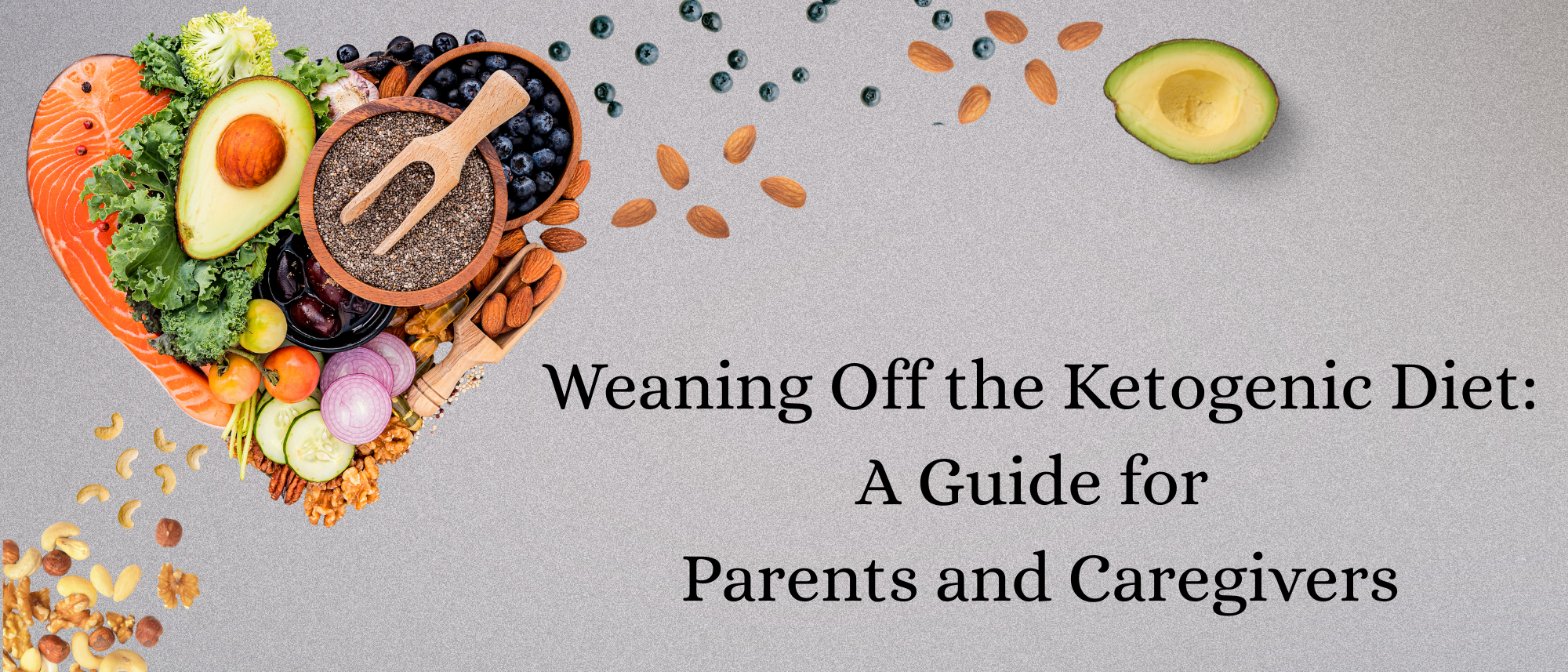Sick Day Survival Guide: Keto Hacks for a Safer Illness
/By: Taylor Parrish, RDN, LD & Laura Dority, MS, RD, LD
We made it…. the kiddos are back in the school routine and life is feeling a bit more organized…manageable even! That is until the first illness hits! Unfortunately, illness is inevitable regardless of diagnosis. Being sick while on a ketogenic diet is sort of a double whammy! It’s important to keep in mind that illness can lower the threshold for seizures so you may see that your child has more seizures during a period of illness – regardless of ketone and glucose levels and maintenance of a ketogenic diet.
It is still very important to have a game plan before your child becomes ill so that you are prepared to maintain ketosis and most importantly hydration until your little keto hero is back to his/her healthy self. Now before you read on for some illness tips, please do not take the information in this blog as medical advice. This blog is just a place to get started for sick day guidance. All specific advice for your keto superstar needs to come from your keto team!
What Can I Do Before My Child Is Sick?
This is the most important aspect of a sick day…planning! Make sure you have the resources at your disposal when you need them.
Ask your keto team for your child’s unique sick day plan that should include the following:
Hydration Goals & Appropriate Use of Electrolyte Liquids such as Pedialyte
Ketone Goals
Glucose Goals (if measured)
Easy to Tolerate Keto Meals (oral eaters)
Half Strength Tube Feeding Recipe (if applicable)
What Can I Do When My Child Is Sick?
Check ketones and make note of any changes from non-sick days
Track seizures
Focus on hydration. When your child is having diarrhea or vomiting, they are losing important fluids. Dehydration can occur more quickly in the keto population.
Encourage fluid intake and offer fluids frequently.
Encourage calorie-free, caffeine-free fluids.
Monitor signs of dehydration closely such as decreased urine output, fewer wet diapers, dry mouth/cracked lips, or lack of tear production when crying.
Follow your keto team’s guidelines on fluid goals and when electrolyte solutions or liquids may be needed. Keep in mind it’s about keeping glucose levels stable during times of poor oral intake, vomiting, diarrhea, and/or tube-feeding intolerance. You don’t want to go overboard with glucose-containing electrolyte solutions such as regular Pedialyte. Something like Pedialyte Zero Sugar may be a better choice for short periods of illness while regular Pedialyte may be appropriate for longer periods of illness.
Choose tablets & capsules for any necessary medications to eliminate unnecessary carbohydrate content. Check with your pediatrician and/or pharmacist for appropriate dosing. If a liquid or chewable medication is recommended or prescribed by your pediatrician, be sure to check with your keto team to see if it’s appropriate. Keep in mind that sugar-free does not necessarily mean carbohydrate-free. A must-have resource for low-carb/carb-free medications is the Charlie Foundation for Ketogenic Therapies No and Low Carb Personal Care Products Guide.
What Can I Expect When My Child Is Sick?
Due to the body’s natural response when fighting an illness, it is not unusual to experience a drop in ketosis before and during illness. When we are ill, the nervous system activates a stress response. Stress hormones are released – including cortisol which promotes the formation of glucose in turn increasing blood glucose levels and lowering ketone levels. Keep in mind (and remind your pediatrician) that normal glucose levels on ketogenic diet therapy are generally 50-70 mg/dL.
On the other hand, ketones may also increase due to dehydration during times of illness. Hydration is the number one goal to focus on during illness.
Due to the fluctuating ketone and glucose levels, seizure control may be impacted. Unfortunately, in most cases of illness, you may only have minimal control over ketone and glucose levels due to the body’s normal response. Try to avoid chasing ketone levels as this will likely lead to frustration without benefit. Keep your focus on hydration and helping your kiddo overcome illness versus obsessing over ketone levels.
If your kiddo is not having any vomiting or diarrhea but struggling with some early satiety or decreased oral intake, consider offering meals where every bite is at the goal ratio. That way it’s not as important (short-term) if they finish the whole meal.
How Do I Manage Vomiting & Diarrhea?
When your child is sick and has vomiting and diarrhea, you may notice an increase in ketones due to dehydration and inadequate intake. You may also notice more lethargy and fatigue. If your child is not eating, it is important to keep your child well-hydrated.
Know your child’s fluid goal and offer your child clear liquids every hour. Clear liquids such as water, broth, electrolyte beverages, ice chips, Pedialyte Zero Sugar, Propel, Powerade Zero, and sugar-free gelatin all count as fluids and are great focal points for the first 24 hours of illness. Of note, your keto team may advise you to dilute some of these items such as Pedialyte, Propel, and/or Powerade Zero with additional water.
If tolerating fluids and vomiting/diarrhea has improved, start with ½ of a keto meal without the added fat (butter/oil) then advance to the ½ meal with the fat included, and finally back to goal meals as able. If your kiddo is struggling with getting back to goal keto meals, try baked chicken and soft, cooked vegetables without the fat source (or a reduced amount of fat). Cauliflower rice with chicken and a little butter is a great option. This is also where chicken or vegetable broth can be well-tolerated.
For those on a tube feeding once fluids are tolerated, start with ½ strength ketogenic formula and advance back to your goal as able.
Most of the time both oral and tube-fed children can be back to their goal keto plans within 2-3 days. Keep in mind that appetite recovery can take longer. When you think about an individual who is not on a ketogenic diet, we expect a decreased appetite during illness. Keto kids are no different! So, it’s okay if you work back up to goal calories slowly, but symptoms of vomiting and diarrhea should not be persistent. If your child is unable to advance to ½ strength formula or meals after clear liquids for 24 hours, call your medical team.
What Are Some Tips for Combating Nausea?
Offer smaller more frequent meals. Not eating anything can often worsen nausea. Even just sipping on broth can help settle the stomach.
Try carb-free herbal teas such as mint or ginger
Reintroduce foods starting with broths, chilled avocado with olive oil, plain scrambled eggs, keto crackers (such as these flax-hemp crackers from the Charlie Foundation), nuts or nut butters, chia seed pudding, or flaxseed porridge
Stick to cool/cold or room temperature foods
Foods with less or no odor may be better tolerated
Try carb-free, carbonated beverages such as diet ginger ale
If MCT oil is part of your plan, titrate up slowly (even start at 5 mL every other meal) because small volumes have less of a chance to adversely affect nausea.
How Long Should I Let My Child Have Vomiting or Diarrhea Before Telling Someone?
Let your keto team know anytime your keto superstar is vomiting or having diarrhea. They should know on day 1 to best guide on preventing dehydration and maintaining ketosis versus reacting to treatment of dehydration.
What Are Symptoms of Illness That Are Alarming?
If your child experiences any indications of excessive ketosis such as the combination of flushed cheeks, increased work of breathing, increased heart rate, vomiting, lethargy, and/or a decreased appetite you should notify a healthcare provider. When these symptoms present together, an ER visit for hydration and monitoring may be necessary. Staying hydrated is your best defense against excessive ketosis.
What Will Happen If We Are Admitted to the Hospital Due to Illness?
If you are admitted to the hospital due to illness, plan to bring at least a day’s worth of keto food/formula (longer if admitted on the weekend) to the hospital already prepared. Hospital cafeteria hours vary, and food service staff may not have all the necessary food needed for an unplanned hospital admission. This is particularly true if you are admitted in the evening or weekend.
If you are at the hospital facility that is the same as your keto team, your keto RD will likely follow your admission closely and provide the medical team with guidance on oral hydration, IV fluid, lab work, and advancement of diet. If you are at a hospital facility that does not have a specific keto program, ask the local team to contact your keto team for guidance.
Always remind the medical team that your child is on a ketogenic diet and should not have any liquid medications unless discussed with your keto team. In addition, in settings like the ER or other areas of the hospital that may not be as familiar with ketogenic diet therapy, gently remind them that IV fluid (if needed) should not contain dextrose or at most be a dextrose 2.5% solution to prevent a rapid rise in glucose. The standard dextrose solution in any hospital is 5% dextrose which is generally not compatible with a ketogenic diet.
Glucose levels may be checked during a hospital admission. Keep in mind that normal glucose for a ketogenic diet is 50-70 mg/dL – For those kiddos not on a ketogenic diet generally glucose goals are >70 mg/dL so there is a difference here. The medical team may need reminding that slightly lower glucose levels are expected for ketogenic diet therapy but again – too low of glucose levels (<40 or 50 mg/dL depending on your keto goals) can happen during illness and should be treated.
Final Advice….
Unfortunately, keto superstars are not immune from getting sick…it’s bound to happen! Remember to stay calm, call your keto team to give them a heads up that your little one is feeling under the weather, reference your sick day plan frequently, focus on hydration, and most importantly give your little one some extra snuggles until they feel back to their amazing self!
References:
Ketogenic Diet Therapies for Neurological Disorders Pocket Guide: 4th Edition by Beth Zupec-Kania, Lisa Vanatta, & Meredith Johnson
Our Journey with Ketogenic Diet Therapy App from the Emily Center at Phoenix Children’s Hospital
Disclaimer:
The advice mentioned in this article is not medical advice and should not be taken as medical advice. You should always check with your medical provider if your child is experiencing any form of illness.























